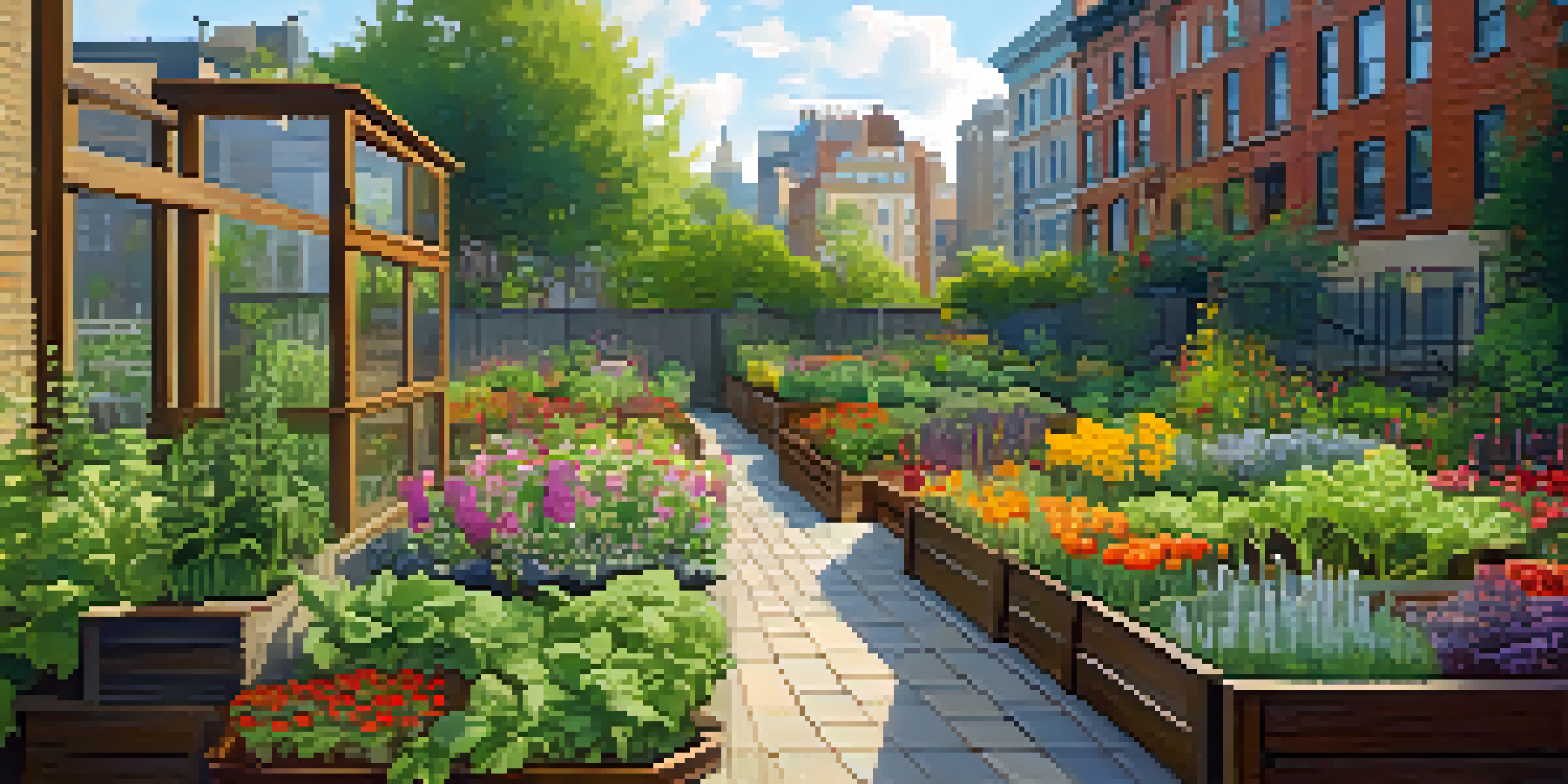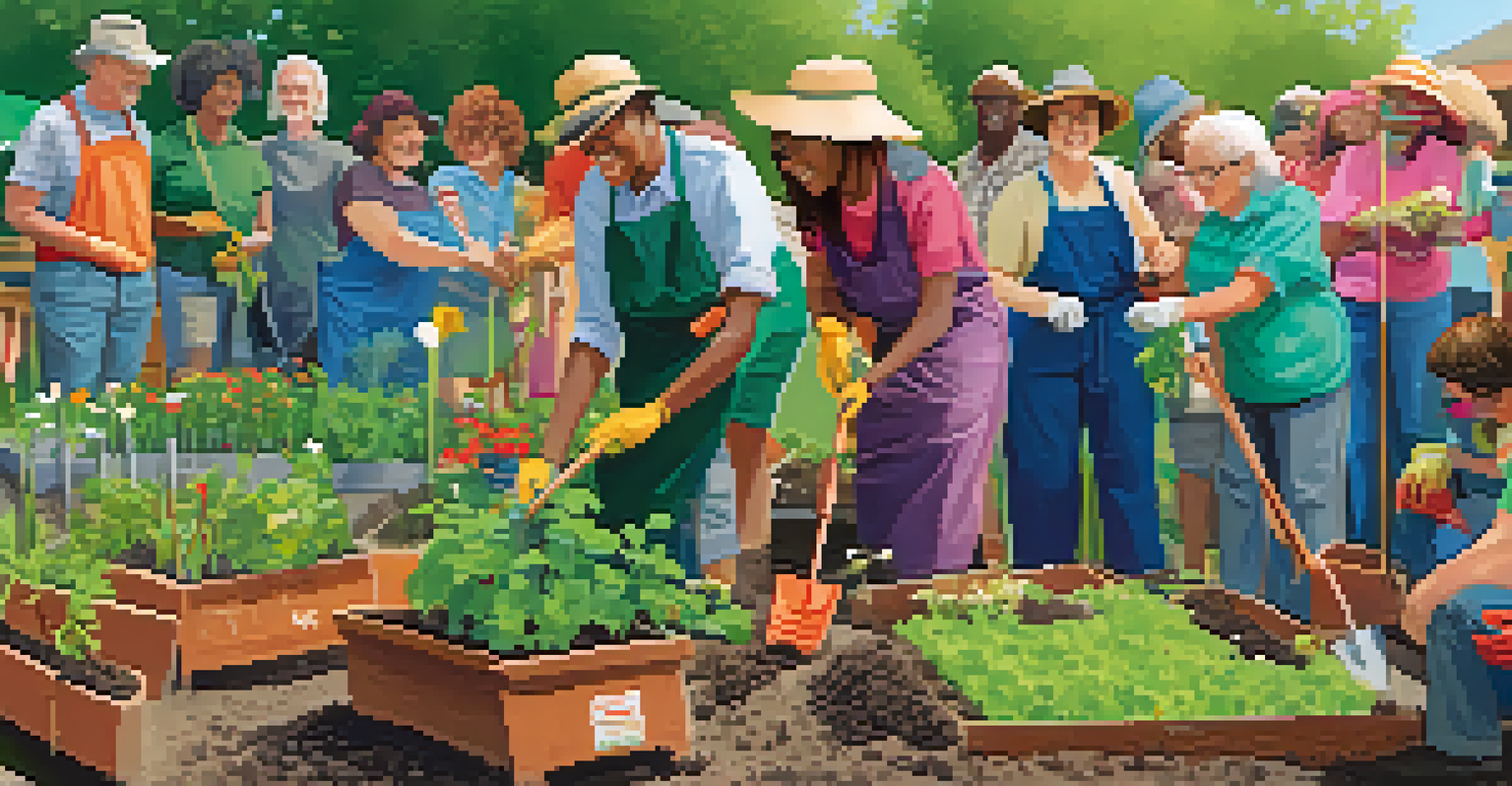Benefits of Urban Gardening for City Dwellers and Communities

Urban Gardening: A Green Retreat in Concrete Jungles
Urban gardening provides a refreshing escape from the hustle and bustle of city life. Imagine stepping out of your apartment and into a small garden oasis, filled with vibrant plants and flowers. This connection to nature can significantly reduce stress levels and improve mental well-being for city dwellers.
Gardening adds years to your life and life to your years.
Incorporating greenery into our urban spaces not only enhances aesthetics but also promotes relaxation. Simple activities like watering plants or harvesting vegetables can create a sense of accomplishment and joy. Over time, these gardens become personal retreats where individuals can unwind and recharge.
Moreover, urban gardening fosters mindfulness, encouraging individuals to be present in the moment. Tending to plants requires attention and care, helping to cultivate a peaceful mindset amidst the chaotic city environment.
Boosting Local Food Production and Security
One of the most significant benefits of urban gardening is its ability to enhance local food production. With more people growing their own fruits and vegetables, cities can reduce their reliance on distant food sources. This not only promotes sustainability but also cuts down on transportation emissions.

Urban gardens can contribute to increased food security within communities. As fresh produce becomes more readily available, families are less vulnerable to fluctuations in food prices. This self-sufficiency fosters resilience, especially in times of crisis when access to food may be threatened.
Urban Gardening Enhances Well-Being
Engaging in urban gardening provides mental health benefits, reduces stress, and fosters relaxation.
Additionally, urban gardening encourages the consumption of fresh, healthy foods. When people grow their own vegetables, they are more likely to incorporate them into their diets, leading to improved health outcomes for the community as a whole.
Fostering Community Connections Through Gardening
Urban gardens serve as communal spaces that bring people together. Whether it's a shared plot in a community garden or a neighborhood beautification project, gardening fosters collaboration and camaraderie among residents. These spaces become hubs for social interaction and collective action.
To plant a garden is to believe in tomorrow.
As neighbors work side by side, they build relationships and strengthen community ties. This sense of belonging can lead to increased social cohesion, making communities more resilient and supportive. People often find common ground through gardening, regardless of their backgrounds.
Moreover, community gardening initiatives can empower residents. By participating in garden projects, individuals gain valuable skills and knowledge, fostering a sense of pride and ownership in their neighborhoods.
Promoting Environmental Awareness and Sustainability
Urban gardening plays a crucial role in promoting environmental awareness. As city dwellers cultivate their own gardens, they become more attuned to ecological issues and the importance of biodiversity. This connection can inspire individuals to adopt more sustainable practices in their everyday lives.
Gardens contribute to urban biodiversity by providing habitats for various species, including pollinators like bees and butterflies. By creating green spaces, urban gardeners help mitigate the effects of urbanization, such as heat islands and poor air quality.
Community Resilience Through Gardening
Urban gardens promote social connections and empower residents, leading to stronger, more resilient communities.
Additionally, urban gardening encourages the use of organic practices, reducing the need for harmful pesticides and fertilizers. This shift not only benefits the environment but also leads to healthier produce for the community.
Enhancing Urban Aesthetics and Quality of Life
Urban gardening can transform dull, gray cityscapes into vibrant, colorful environments. Green spaces not only beautify neighborhoods but also enhance property values. A well-maintained garden can make an area more appealing to both residents and potential buyers.
Moreover, these gardens can provide essential ecosystem services, such as improved air quality and reduced noise pollution. Plants absorb carbon dioxide and release oxygen, contributing to a healthier urban atmosphere.
In essence, urban gardening elevates the overall quality of life for city dwellers. Access to green spaces promotes physical activity, encourages community engagement, and fosters a healthier lifestyle.
Encouraging Educational Opportunities for All Ages
Urban gardens can serve as excellent educational platforms for individuals of all ages. Schools and community organizations often utilize gardens to teach children about the environment, nutrition, and the food system. These hands-on experiences cultivate a sense of curiosity and responsibility towards nature.
Adults can also benefit from educational opportunities in urban gardens. Workshops on sustainable gardening practices, cooking demonstrations, and environmental awareness events can empower individuals to make informed choices in their own lives.
Innovations Shape Urban Gardening's Future
Emerging trends like vertical gardens and technology integration are making urban gardening more accessible and impactful.
By fostering a culture of learning, urban gardens create informed citizens who are equipped to advocate for sustainability and environmental justice within their communities.
Supporting Mental Health and Well-Being
Engaging in gardening activities has been shown to have numerous mental health benefits. The act of nurturing plants can provide a therapeutic outlet, helping individuals manage anxiety and depression. Connecting with nature has a calming effect, making gardening an effective form of stress relief.
Additionally, urban gardening can promote physical activity, which is crucial for overall well-being. Whether it’s digging, planting, or weeding, these activities encourage individuals to stay active and maintain a healthy lifestyle.

As communities embrace gardening, they create supportive environments where mental well-being is prioritized. The shared experience of gardening can foster connections, allowing individuals to share their struggles and triumphs with others.
The Future of Urban Gardening: Innovations and Trends
As urban gardening continues to gain popularity, innovative trends are emerging to enhance its impact. Vertical gardens, hydroponics, and rooftop farming are just a few examples of creative solutions that maximize space in densely populated areas. These advancements allow more people to participate in gardening, regardless of the size of their living space.
Technology is also playing a role in the evolution of urban gardening. Apps for plant care, community gardening networks, and online resources are making it easier for individuals to connect, learn, and share their gardening experiences.
Looking ahead, urban gardening is poised to become an integral part of city planning. As cities recognize the benefits of green spaces, we can expect to see more initiatives that promote sustainable practices, enhancing the quality of life for all residents.